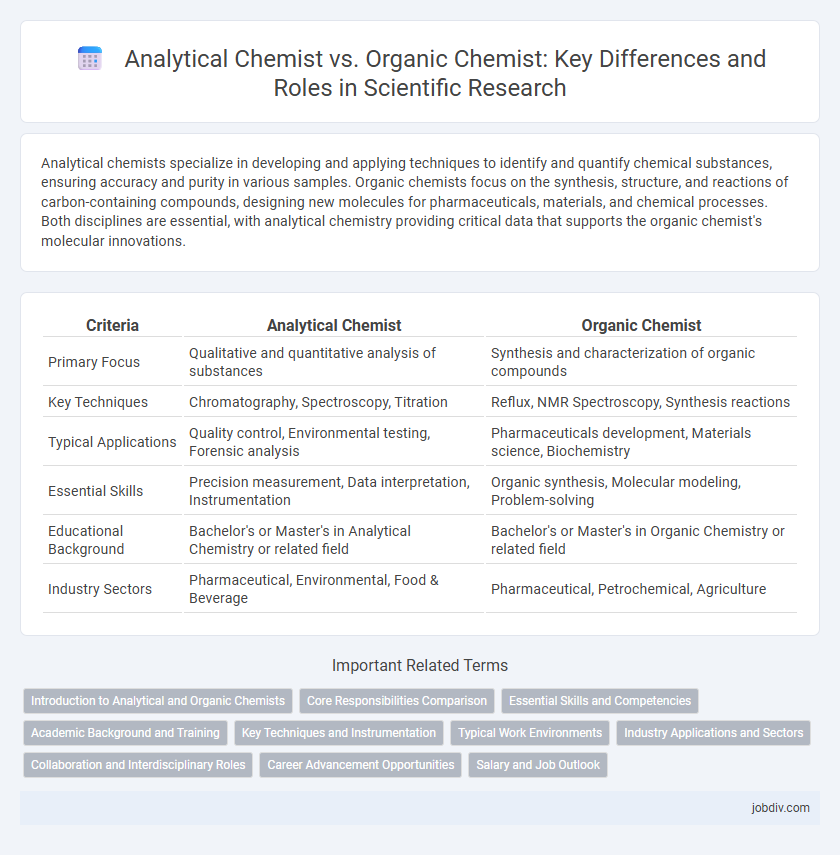Analytical chemists specialize in developing and applying techniques to identify and quantify chemical substances, ensuring accuracy and purity in various samples. Organic chemists focus on the synthesis, structure, and reactions of carbon-containing compounds, designing new molecules for pharmaceuticals, materials, and chemical processes. Both disciplines are essential, with analytical chemistry providing critical data that supports the organic chemist's molecular innovations.
Table of Comparison
| Criteria | Analytical Chemist | Organic Chemist |
|---|---|---|
| Primary Focus | Qualitative and quantitative analysis of substances | Synthesis and characterization of organic compounds |
| Key Techniques | Chromatography, Spectroscopy, Titration | Reflux, NMR Spectroscopy, Synthesis reactions |
| Typical Applications | Quality control, Environmental testing, Forensic analysis | Pharmaceuticals development, Materials science, Biochemistry |
| Essential Skills | Precision measurement, Data interpretation, Instrumentation | Organic synthesis, Molecular modeling, Problem-solving |
| Educational Background | Bachelor's or Master's in Analytical Chemistry or related field | Bachelor's or Master's in Organic Chemistry or related field |
| Industry Sectors | Pharmaceutical, Environmental, Food & Beverage | Pharmaceutical, Petrochemical, Agriculture |
Introduction to Analytical and Organic Chemists
Analytical chemists specialize in the identification and quantification of chemical substances using techniques such as chromatography, spectroscopy, and electrochemical analysis to ensure product quality and safety. Organic chemists focus on the study, synthesis, and properties of carbon-containing compounds, often designing new molecules for pharmaceuticals, materials, and chemical reactions. Both disciplines collaborate closely to advance chemical research and industrial applications through precise analysis and innovative synthesis.
Core Responsibilities Comparison
Analytical chemists specialize in identifying the composition and concentration of substances using techniques such as chromatography, spectroscopy, and mass spectrometry to ensure product quality and safety. Organic chemists focus on designing, synthesizing, and characterizing carbon-based compounds, often developing new molecules for pharmaceuticals, polymers, or agrochemicals. While analytical chemists prioritize precise measurement and validation, organic chemists emphasize molecular structure innovation and reaction mechanisms.
Essential Skills and Competencies
Analytical chemists excel in techniques such as chromatography, spectroscopy, and quantitative analysis to identify substance composition and concentration with precision. Organic chemists demonstrate expertise in synthesizing, characterizing, and modifying carbon-based compounds, requiring strong skills in reaction mechanisms, purification, and structural elucidation. Both roles demand proficiency in laboratory instrumentation, data interpretation, and problem-solving capabilities specific to their respective focus areas.
Academic Background and Training
Analytical chemists typically hold degrees in chemistry, chemical engineering, or a related field, with specialized training in instrumental techniques such as chromatography, spectroscopy, and mass spectrometry. Organic chemists usually possess advanced degrees emphasizing synthesis, reaction mechanisms, and molecular structure, often requiring extensive laboratory experience in organic synthesis and purification methods. Both disciplines demand rigorous coursework in general chemistry, but analytical chemists prioritize quantitative analysis skills, while organic chemists focus on the design and manipulation of carbon-based molecules.
Key Techniques and Instrumentation
Analytical chemists specialize in techniques such as chromatography (GC, HPLC), spectroscopy (NMR, IR, UV-Vis), and mass spectrometry for quantitative and qualitative analysis of chemical substances. Organic chemists primarily utilize synthetic methodologies, reaction mechanisms, and purification techniques like recrystallization and distillation, relying heavily on NMR and IR spectroscopy for structure elucidation. Instrumentation overlap occurs in NMR and IR, yet analytical chemistry emphasizes precision analytical tools, while organic chemistry focuses on synthesis and characterization methods.
Typical Work Environments
Analytical chemists typically work in laboratories within pharmaceutical companies, environmental agencies, and food safety organizations, where they focus on testing and quality control using instruments like chromatographs and spectrometers. Organic chemists are commonly employed in research institutions, chemical manufacturing plants, and academic laboratories, where they design and synthesize new organic compounds for applications in medicine, agriculture, and materials science. Both roles require adherence to strict safety protocols and often involve collaboration with cross-functional scientific teams.
Industry Applications and Sectors
Analytical chemists play a crucial role in pharmaceutical, environmental, and food industries by developing methods to identify chemical compositions and ensure product safety and compliance. Organic chemists primarily focus on the design and synthesis of new molecules, driving innovation in sectors such as drug discovery, petrochemicals, and specialty chemicals. Both disciplines collaborate in quality control and research and development to optimize manufacturing processes and product performance.
Collaboration and Interdisciplinary Roles
Analytical chemists specialize in developing precise methods for detecting and quantifying chemical substances, providing critical data that supports organic chemists in synthesizing and characterizing new compounds. Collaboration between analytical and organic chemists enhances the accuracy of molecular structure elucidation and purity assessment, accelerating drug discovery and material innovation. Interdisciplinary roles often involve joint efforts in spectroscopy, chromatography, and mass spectrometry techniques, bridging gaps between compound synthesis and comprehensive analysis.
Career Advancement Opportunities
Analytical chemists have strong career advancement opportunities in pharmaceuticals, environmental testing, and quality control due to their expertise in instrumental analysis and method development. Organic chemists often advance by specializing in drug design, synthetic pathways, or materials science, leveraging their skills in molecular synthesis and reaction mechanisms. Both fields offer roles in research leadership, regulatory affairs, and industrial innovation, with career growth influenced by advanced degrees and interdisciplinary collaboration.
Salary and Job Outlook
Analytical chemists typically earn an average salary ranging from $55,000 to $85,000 annually, with job growth projected at 7% over the next decade due to increasing demand in pharmaceuticals and environmental testing. Organic chemists command salaries between $60,000 and $90,000 per year, driven by opportunities in drug development and chemical manufacturing, with a similar job outlook growth rate of around 6%. Both specialties offer strong career prospects, but organic chemists often experience higher earning potential in research and development sectors.
Analytical Chemist vs Organic Chemist Infographic

 jobdiv.com
jobdiv.com